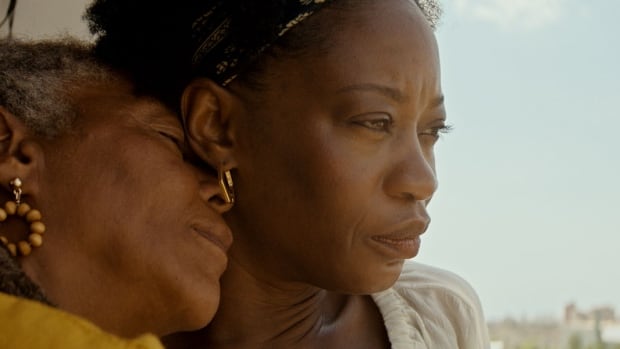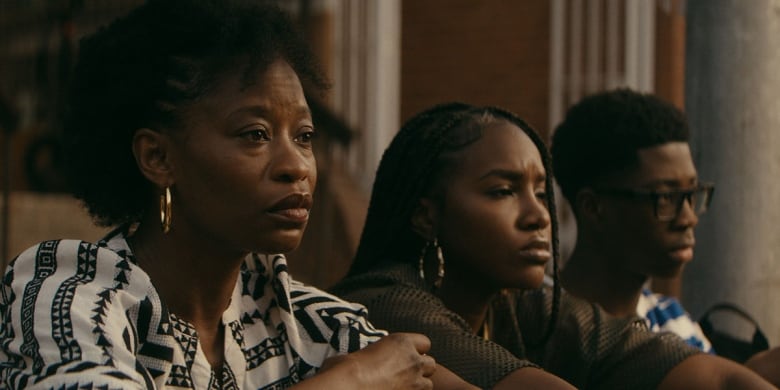
Cutaways is a personal essay series where Canadian filmmakers tell the story of how their film was made. This TIFF 2024 edition by director Karen Chapman focuses on her film Village Keeper.
When I was a child, I wondered if rage was contagious. And if I caught rage, would I then hurt someone that I loved? Nearly 20 years went by, and my mom still winced at unexpected touch or loud sounds. The lingering effects of my father’s anger lasted years after he had gone.
Before I started writing Village Keeper, I was ruminating on a handful of themes. Hard truths that go lifetimes without being spoken. The complicated duality of loving someone who hurts you. Class divides and the demoralizing pursuit of upward mobility, with the strain it puts on breadwinners (particularly single mothers). The enduring capacity of mothers living with broken hearts while building love-filled lives for their children.
It was a challenging time in my life. I was caring for my mother and had just found out that the man who killed my father had died. I found myself reaching for ways to describe a range of emotions that I lacked language for.
Coming from documentary filmmaking, however, the task of writing a narrative felt impossible. I was usually interested in making films that decolonized the gaze and told stories in cinéma-vérité style, based on an ethical foundation of dignity and permission. But I knew I needed an anchor, a window, an opportunity to create something artful, and I’d always found safety in the visual poetry of cinema.
So I began to write without judgment, and for the first time, I felt the world around me slip away. I started to hear characters speak with such specificity that I felt ignited, like I was racing to catch each word.
Flash-forward to the first day of a 12-day shoot on a micro-budget film, one we were cautioned against making given our page count, our budget and the fact that I was eight and a half months pregnant. It was raining heavily, and we were already behind.
Our first shot was on the subway just after rush hour. There was no time for rehearsal, but we had detailed camera blocking and the looming threat of losing our next location.
It was thrilling.
For most of us, Village Keeper was our first feature. But where we lacked experience, we made up for it with enthusiasm. We burrowed toward the unknown, and the moment I called action, Olunike Adeliyi locked in as Jean and became an overworked mother finally on her way home. Olunike understood how to hold both fatigue and longing in the same breath.
After years of rejection and planning, I knew that we were on the right path. Being ready with a plan, but present and malleable enough to adapt, became our adage.

Inspired by Gillo Pontecorvo’s The Battle of Algiers, we cast both actors and non-actors for leading roles in Village Keeper, including family friend and retired nurse Maxine Simpson as Grandma Brenda. Maxine had never read a script before, but she has an ease and warmth about her that is universally familiar. Zahra Bentham’s effortless defiance as Tamika completed the mother-daughter-grandmother triangle and the foundation for this film.
In making a film about the effects of violence, it was important to me to prioritize our cast and crew’s safety on set. We were fortunate to be led by decolonial scholar d’bi.young anitafrika, who also made an appearance in the film, and began each day with breathing exercises and affirmations.
Our days were long and complicated, but I’m so proud of what we accomplished together as a team.
With the help and careful eye of our director of photography, Jordan Oram, we adapted a style in shooting that felt like the camera was dancing on its tippy toes. The camera’s role was to be a quiet observer of life unfolding around it.
Emotions are often contradictory and simultaneous, and music and sound design helped us create a layered tapestry of diegetic sound, reggae and folk music. I met our composer, Dalton Tennant, in church as a teenager and watched him teach himself how to play the piano. I knew that his unorthodox approach to music, emotion and memory would be the right approach to bind the film together.
My mother was adamant that I finish making Village Keeper at all costs. She understood the urgency of unearthing shame and finding ways to amplify the voices of women who’ve survived domestic abuse. Village Keeper is a love letter filled with possibilities for mothers who are running on empty. It’s a reminder of small affirming gestures of self-love. A bucket for their wells.
It’s a testament to resilience and a call to action to create a world where women’s stories are heard and valued.
Village Keeper screens at the 2024 Toronto International Film Festival, which runs September 5-15.